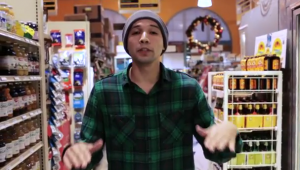Ultimately, they hope to expand the program statewide and inspire an army of young activists to change their communities, demand healthy food in schools, and press local governments to help make their neighborhoods more conducive to good health.
“We’re putting the onus not just on the individual but also on the community, and that begins on the street, at home and at school,” poet-mentor José Vadi, 27, of Oakland told me. “It’s a new approach that can be seen as very political.”
The new tactic comes none too soon, says Dr. Dean Schillinger with the California Diabetes Program, run jointly between the state and UCSF. When we discussed that project’s mission, he minced no words about the severity of the diabetes epidemic.
“We’re at a tipping point with diabetes,” he said. He called “frightening” a study published in May in the journal Pediatrics which found that just between 2000 and 2008, rates of diabetes and prediabetes among U.S. youth ages 12 to 19 shot from 9 percent to 23 percent.
One in seven Californian adults has the disease, and the number is rising, reports the California Diabetes Program. Diabetes is the leading cause of blindness, amputations and kidney failure, and a major contributor to heart attacks and strokes. It doubles a person’s risk of death.
Individual health choices are still an important factor in the disease, say Schillinger and Vadi. But they don’t believe we’ll ever defeat diabetes if we focus on that aspect alone.
“We understand that diabetes is the result of a complex interplay between genetic risk, environment and behavior, and those three things are very tightly woven,” Schillinger said. “They’re not three independent pillars.”
Vadi, whose grandmother died of diabetes, feels the effects personally. Where he used to live, in downtown Oakland, his most practical food options within a mile and a half were a pricey natural-foods store and a McDonald’s, kitty-corner from each other. Day to day, he said he faced a choice between health and cost.
In Vadi’s video-poem, “The Corner,” he rails against the food industry’s marketing of “deep-fried death” and “corporate-sponsored deadly delicacies.”
There’s a clear common enemy, a sinister, selfish villain in Vadi’s verse: Big Food. In “Pushin’ Weight,” poet Simone Bridges portrays herself as a cold-blooded drug dealer pushing sugar to kids as if it were cocaine. In “Health Justice Manifesto,” the poets’ collaborative theme poem, they assert: “We believe it is the individual’s responsibility to maintain physical fitness. However, it is nearly impossible for those of us who live in neighborhoods without safe streets, parks or playgrounds, where the nearest substitute is often inside a fast food restaurant’s playpen,” all benefits which they add are “readily available for wealthy neighborhoods.”
When I first heard about the Bigger Picture, that struck me as its most astute aspect: framing diabetes as a matter not simply of health, but of inequality. Little inspires youth quite like a fight for justice.
Schillinger agrees. “That’s the innovation,” he told me. “Youth are especially incensed by any form of injustice.”
Less political poems, like Joshua Merchant’s “Hear No” and Erica McMath Sheppard’s “Death Recipe,” also pack emotional power. They describe in painful, personal detail the unhealthy habits embedded in their families, and how hard it is to change.
Schillinger is especially eager to reach Central Valley sites like Stockton and Fresno, “where rates of diabetes are just astounding, and often we don’t hear the stories from these highly impacted areas.”
